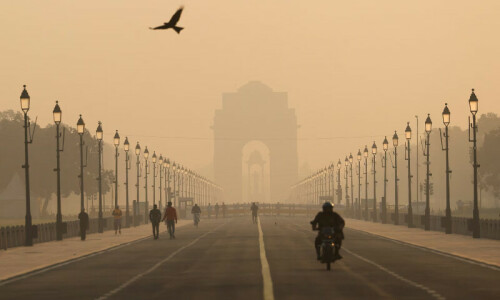
The UN's Human Rights Committee said on Thursday that freedom of expression was a “meta-right” underpinning all human rights everywhere.
A long-awaited document from the panel of 18 jurists also said that freedom of opinion, and by extension religion, should not be restricted under any circumstances and warned governments that did so they would be violating a basic UN accord.
The independent experts set out their trenchant stance in a “general comment” on how parts of the UN's Covenant on Civil and Political Rights should be interpreted and applied.
The comment, committee vice-chairman Michael O'Flaherty, told a media conference, “is a strong reaffirmation of the central importance for all human rights of the freedom of expression”, even of giving views some see as deeply offensive.
The 15-page document, interpreting two paragraphs of the 1976 Covenant, hit at anti-terror laws, monopoly media, anti-blasphemy statutes and prosecution of maverick historians.
Islamic and some Western countries have blasphemy laws, and the “history” strictures were clearly aimed at criminalisation in some European countries, including Germany and Austria, of writings suggesting the World War II Holocaust was a myth.
Norway Debate
By implication, the committee waded into a debate raging since last Friday's killings in Norway by an anti-immigrant extremist over whether public or media criticism of Muslim practices, dubbed by some “Islamophobia”, should be restricted.
Rather, said the jurists -- including four from Muslim states -- it was “prohibitions on displays of lack of respect for a religion or other belief system, including blasphemy laws” that would violate “free speech” provisions in the 167-nation covenant.
That stricture, they said, would also apply to any move “to prevent or punish criticism of religious leaders or commentary on religious doctrine and tenets of faith” - action that Islamic countries have long sought in the world body.
Some Muslim states such as Pakistan have signed up to the covenant but argue that shariah law -- which bars conversion from Islam to other faiths or to atheism -- takes precedence.
O'Flaherty said such a view would violate the pact.
The Committee, functioning since the mid-1970s, monitors performance under the 52 articles of the covenant's signatory-countries who are expected to make regular reports and appear before the body to answer often tough questions.
With the UN 57-nation Human Rights Council largely controlled by a bloc of African, Asian and Islamic countries backed by Russia, China and Cuba who combine to head off criticism, the Committee has gained in importance.
Rights activist bodies say it can be relied upon for quick responses -- such as a condemnation it issued on Wednesday of Belarus for the execution of two men despite the fact that their cases were being reviewed by the Committee.
It has no enforcement mechanism, but countries generally prefer to avoid falling foul of the 18 jurists who all have reputations as strong-minded legal and human rights specialists ready to speak out on violations anywhere.
And Thursday's “general comment” will be given more weight by UN human rights high commissioner Navi Pillay who officials said had welcomed the document and would be promoting it.














































Dear visitor, the comments section is undergoing an overhaul and will return soon.